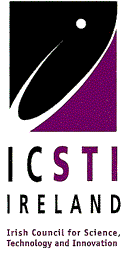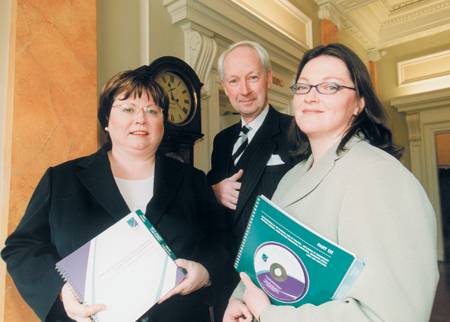| 2004 |

|
YEAR BOOK |
Forf�s � Irish Council for Science, Technology and Innovation
|
The Irish Council for Science, Technology and Innovation (ICSTI)
|

|

|
The Irish Council for Science, Technology & Innovation (ICSTI) was created in April 1997. Its role is to advise the Government and the Board of Forf�s on science, technology and innovation (STI) policy. The Council has twenty-five members and is chaired by Dr Edward M. Walsh, President Emeritus, University of Limerick.
The Council's work programme is implemented through the establishment of Task Forces which bring forward draft recommendations on priority topics for ratification by the Council.
In the past year, the Council has been focusing on the following priority areas of work:
-
State Expenditure Priorities for 2005
(Chair: Dr. Mike Hopkins, Physicist Scientist, Plasma Research Laboratory, Dublin City University)
Following ICSTI's advice to Government in its Statement on State Expenditure Priorities for 2004 , a number of key measures were included in the Budget and Estimates for 2004 announced by the Minister for Finance in December 2003. These included an R&D tax credit for enterprise, stamp duty exemption for transfers of intellectual property, re-instatement of investment in the Programme for Research in Third Level Institutions (PRTLI) and a sustained increase in the budgets for Science Foundation Ireland and for applied research through Enterprise Ireland.
During the early part of 2004, the Council embarked on preparing advice to Government in a similar Statement for 2005. This Statement (published in August of this year) will form part of an annual series of Statements by the Council on expenditure priorities in the areas of science and technology.
-
National Code of Practice for the Management of Intellectual Property from 100% Publicly Funded Research
(Chair: Dr Ena Prosser, Director, Biotechnology Research Directorate, Enterprise Ireland)
In April 2004, the T�naiste and Minister for Enterprise, Trade and Employment, Ms Mary Harney, T.D., launched the Council's Statement entitled National Code of Practice for the Management of Intellectual Property (IP) from Publicly Funded Research . The aim of this Code is to build on existing knowledge and expertise and to harmonise intellectual property management systems across public research organisations. The Code applies to intellectual property generated from research that is funded entirely from public sources.
The Code of Practice provides a framework for commercialisation of public investment in Irish research and development (R&D) through setting out guidelines on:
� IP management strategy in public research organisations;
� the role and responsibility of the technology transfer office;
� procedures for the identification of intellectual property rights (IPR) and
� the education of researchers;
� evaluation, protection and disclosure of IP;
� ownership;
� commercialisation;
� sharing of the benefits;
� ensuring continuing access to IP and research materials for ongoing research;
� managing conflicts of interest; and
� monitoring and evaluating public research organisation performance.
A workshop, held in conjunction with the Launch at the Royal College of Surgeons in Ireland, explained the principles of this Code.
-
National Code of Practice Managing Intellectual Property from Public/Private, Co-Funded Research
(Chair: Dr Ena Prosser, Director, Biotechnology Research Directorate, Enterprise Ireland)
At the Launch of the above National Code of Practice, the T�naiste and Minister for Enterprise, Trade and Employment, Ms Mary Harney, T.D., requested the Council to embark on new work to develop guidelines for Managing Intellectual Property from Public-Private, Co-Funded Research in consultation with industry, research funding bodies, public research organisations and the financial community. This work has now commenced.

-
Sustainable Development
(Chair: Dr Mike Peirce, Chairman, Mentec Ltd)
The Council Statement on Sustainable Development , being prepared for publication, considers the implications for Irish public policy of sustainable development as a national and international goal. In the light of the increasing interest in, and commitment to, sustainable development as an overarching concept in economic, environmental and social policies, ICSTI sought to identify constraints and opportunities and to make recommendations so as to enable science and technology to make a fuller contribution to sustainable growth. The examination of case studies in renewable energy, cleaner production, and agriculture and forestry, allowed the Council to identify necessary actions and to make recommendations on R&D needs and the operational implementation of improvements.
The conclusions of the analyses, and of the review of international policy developments together, point to the desirability for a framework of principles to bring policy coherence to the many dimensions of the role of science and technology. The framework addresses particular themes that affect the capability of S&T in supporting the high level activities of framing and implementing integrated policy options. In the wider context, the role of S&T should also encompass the need to enable Ireland to play its proper part in the global endeavour to promote sustainable development and the framework includes this as a strategic aim.
-
An Examination of the Key Opportunities and Threats for Ireland of Nanotechnology
(Chair: Prof. Donald Fitzmaurice, Solar Technology Group, Chemistry Department, NUI Dublin)
This work by ICSTI, which culminated in a Statement on Nanotechnology , published in July, reviews the threats and opportunities for Ireland and formulated recommendations so as to ensure that the country exploits the opportunities presented by its relative strength in Nanotechnology. These recommendations relate to new and established indigenous companies, multinational companies, research infrastructure, the wider community and others and are actions required if Ireland is to derive the social and economic benefits presented by the nanotechnology opportunity. The Statement also recommends a coherent approach among all the stakeholders to promote Ireland internationally as a centre of excellence on Nanotechnology. It further recommends that a national Nanotechnology Forum be established to facilitate cooperation between the stakeholders and to ensure coherence in our national approach to nanotechnology and the opportunities it presents.
-
Strategic Technology Platforms
(Chair: Mr Paul Holden, Managing Director, R�dacteurs Ltd)
As a follow up to the ICSTI Technology Foresight exercise of 1998/1999, the Council is currently examining processes to identify Strategic Technology Platforms for Ireland in an effort to guide future investment in science and technology.
The Council has reviewed the concept and purpose of Strategic Technology Platforms internationally. It has examined the scope and content of the existing activities in the research base, in industry, and in natural resources as an aid to defining and developing technology platforms for Ireland, and it has initiated the mapping out of a process methodology for identifying and prioritizing such platforms. The Council submitted its findings and key recommendations, in this context, to the Enterprise Strategy Group which reported in July 2004.
-
European Research Area
(Chair: Dr Peter Heffernan, Chief Executive, The Marine Institute)
Following an examination and review of the European Research Area Initiative , as set out by the European Commission, the Council has reviewed issues relating to research mobility, research infrastructures and research excellence at EU level. In response to the European Commission's communication on the topic of Basic Research in January 2004, ICSTI produced two Statements on the matter. The Council considered that the debate on the quality of additional funding for basic research in Europe came at an appropriate time when initial concepts for a Seventh Framework Programme (2006-2010) are being developed and new financial perspectives are being negotiated. It supported the view that additional resources be made available in the EU Framework Programmes to build excellence in basic research at a European level. ICSTI also recommended that, in order to promote excellence, funding should be awarded on a competitive basis, amongst individual researchers, or individual research teams, and that the sole criterion should be excellence, as identified by international peer review. ICSTI recognizes that, in considering basic research, a number of issues, including research infrastructures, human resources and mobility funding, are important, but emphasises the importance of maintaining a clear focus on the issue of research quality in Europe. The Council continues to review developments relating to the European Research Area and particularly Ireland's response to those developments.
Contact: The ICSTI Secretariat is provided by Forf�s, the national policy and advisory board for enterprise, trade, science, technology and innovation. Correspondence should be addressed to:
The ICSTI Secretariat, Wilton Park House,
Wilton Place, Dublin 2; Tel: +353 1 607 3186;
E-mail: [email protected]